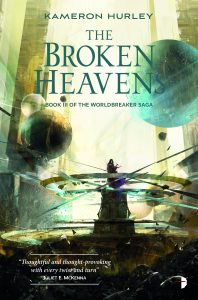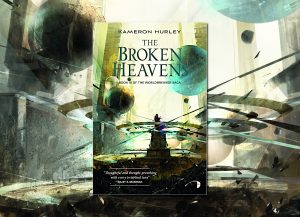THE BROKEN HEAVENS by Kameron Hurley (Book Review)
 How do you describe a book like The Broken Heavens, the concluding volume of Kameron Hurley’s epic fantasy trilogy, The Worldbreaker Saga? If you are familiar with Hurley’s ouevre, it usually straddles the boundary between science fiction and fantasy. If you plot them on a spectrum from the time-travel military SF of The Light Brigade to the women-only generation-starship The Stars Are Legion (lovingly nicknamed Lesbians in Space), and the gloriously messy bug-punk mercenaries of her Godswar Trilogy that started it all off, Worldbreaker is the most overtly fantasy (and the most Epic), but there are still elements one might associate with SF – alternate universes, time travel, satellites, and some very alien flora and fauna, including the types of people and societies. But it has magic, chosen ones, world-shattering conflicts, politics and everything else you could want from an epic fantasy.
How do you describe a book like The Broken Heavens, the concluding volume of Kameron Hurley’s epic fantasy trilogy, The Worldbreaker Saga? If you are familiar with Hurley’s ouevre, it usually straddles the boundary between science fiction and fantasy. If you plot them on a spectrum from the time-travel military SF of The Light Brigade to the women-only generation-starship The Stars Are Legion (lovingly nicknamed Lesbians in Space), and the gloriously messy bug-punk mercenaries of her Godswar Trilogy that started it all off, Worldbreaker is the most overtly fantasy (and the most Epic), but there are still elements one might associate with SF – alternate universes, time travel, satellites, and some very alien flora and fauna, including the types of people and societies. But it has magic, chosen ones, world-shattering conflicts, politics and everything else you could want from an epic fantasy.
But let’s go back a bit. Several years, in fact. When The Mirror Empire came out in 2014, it was Hurley’s fourth book and the culmination of writing she’d been doing for years. In a way, it read like debut epic fantasies often do – bursting at the seams with amazing, original ideas, but a bit messy and not always easy to follow. It was dark, too, though at a time when the genre was drowning in grimdark “realism”, this was grimdark High Fantasy, and without anything recognisably medieval. The second volume, in 2015, improved (for me) on the storytelling, streamlining some of the plot, picking up the pace, and delivering some truly shocking moments. It left the third and final volume with a lot of heavy lifting to do, though.
Which may be why it took five years to get to this point. In that time, of course, Hurley has written two other acclaimed and successful novels, any number of Patreon short stories, and published some award-winning non-fiction as well. Her writing has continued to level up, and her fanbase has swelled. When it came time to actually get the Worldbreaker Saga finished (by no means a certainty, apparently), it wasn’t clear how the “new” Hurley would approach it.
To start with, and wisely, Hurley resumes the story a year later, allowing us to gently catch up with all the (surviving) characters as they update us on what they’ve been up to. Not quite a “last time on The Worldbreaker Saga”, but handy if, like me, it has been some time since the last book (I don’t do re-reads). Also handy is the extensive glossary and character list at the back–which I had to use plenty in the previous books as well (it’s that sort of fantasy).
Things aren’t good, but at the same time, the apocalypse has reached a bit of a stalemate after the epic catastrophes of the previous two books. People are planning for the endgame, quite literally, which gives the book a clear focus, and it’s almost as if a sort of “reset” button has been pushed. Yes, events from previous books matter, and a lot of long-laid seeds start to bear fruit, but everyone knows what they are dealing with now, so they can act rather than react. It made a nice change, for me (I do like a strong plot), and I think it’s one of the clearest signs of the author’s increasing skill. Despite being quite a chonky beast, the book seems a lot sleeker, a lot sharper than the previous two. In fact, you could almost (almost!) read this without the first two, if you were willing to accept you were coming in at the third act and would have to live with some missing backstory. (I mean, I know some standalone stories that are just as confusing!)
So does it pay everything off? You bet it does. We finally learn the secrets of the satellites, the mysteries of the world-breaking temples, and find out the fates of all the characters caught up in this cataclysm – good, bad, and in-between. In fact, the most enjoyment stems from far-flung characters finally coming together (like in any good Epic) to join forces (or not) at the final confrontation. There are a fair few shocking moments, a few more messy disasters before the end, and it wouldn’t be (new) Hurley without some mind-fuckery, but I found the ending surprisingly satisfying, considering what we’d gone through to get to it. It’s also, without wanting to spoil too much, a bit more optimistic than you might have expected at the end of book one or two – perhaps a reaction to the darker timeline we seem to have found ourselves on in reality.
But don’t get me wrong, there’s still violence, betrayal, sacrifice, tragedy, injustice, horror, brutality, and unjust deserts galore. This is grim, gooey, visceral fantasy in an alien setting but with characters who are all too human in their needs, wants, failings, insecurities, and general unreadiness for the roles they need to play. There are no heroes here, but there is heroism.
These books do come with challenges. There are a lot of characters, almost all with alien names from the various original cultures, many of which sound quite similar. As if that wasn’t bad enough, there are duplicates of those characters from the alternate universes. Apparently Hurley needed a wiki to keep track of everyone – living, dead, and doppelgänger – and sometimes it did feel like more than just the glossary would be nice. Maybe I should have been taking notes, but I generally just go with the flow and muddle along rather than obsess about every detail – and I managed just fine, even after a five-year gap!
The unfamiliar setting – amazing as it is – keeps you on your toes as well, but this (and the rest of it) shouldn’t present too many difficulties to the hardened fantasy reader. However, like, say, Malazan, it’s not for the faint-hearted – as you might have guessed from the mixed reception the first book has had. I’m not going to pretend this will be a series everyone will love- as if any series is!
Still, if you like your fantasy brimming with not-oft-seen concepts and unusual settings, then you might just revel in this as I did. Sentient trees, cavalry on lizard-bears (or dogs), organic ships, nonbinary genders and diverse societies, satellite magic, collapsing multiverses…it’s probably the most creative and original fantasy I’ve ever read (the closest I think I’ve come to is that of the game Morrowind, which is a huge compliment from me). And yet, at heart, it really is a proper Epic Fantasy, just one that pushes all the boundaries of that venerable genre.
So, if you’ve been waiting for the last book for five years and are nervous about jumping back in, I hope I’ve allayed your fears. If you were waiting for the series to be complete before starting it, well, wait no more! If you’ve never heard of the series, or the author, this might not be the best starting point (unless you’re a die-hard fantasy fan), but you really should start somewhere. Kameron Hurley is one of my very few* must-read authors right now, and I can’t wait to see what she does next.
* (More a reflection on me than the state of the genre, which is booming!)


[…] add Kameron Hurley’s brilliant Worldbreaker Saga, which I just reviewed over at the Fantasy Hive. Grim, gooey, visceral…but ultimately hopeful? Who […]
Great review of a great book – and an amazing series. I don’t generally make time for re-reads, but I re-read the first 2 books going into this, begged and pleaded for an ARC, and just devoured it over the Christmas holidays. Everything I was hoping for and more.